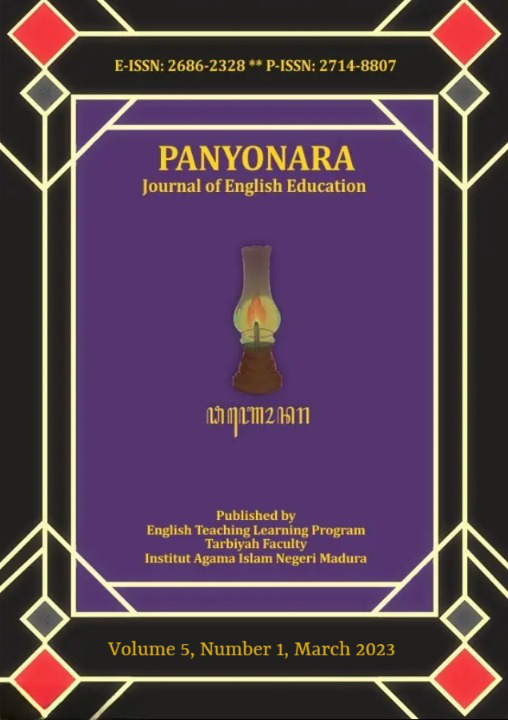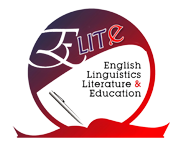Indonesian English Teachers’ Multicultural Awareness : A Case Study at Two Pesantren-Based Schools
 Abstract views: 259
,
Abstract views: 259
,
 PDF downloads: 376
PDF downloads: 376
Abstract
Multicultural awareness is one of pivotal things for English teachers. English teachers who teach a language linking people around the world with many differences, should have a good understanding of multicultural awareness so that they can be an excellent example for the students of how to behave well to people with different cultural background. The aim of this study is to describe Indonesian English teachers’ multicultural awareness in teaching multicultural students and explore the influencing factors of English teachers’ multicultural awareness in teaching multicultural students. This study was conducted using a qualitative approach. The data were collected through interviewing the English teachers and some students having different multicultural background as well as observing the English learning process. The gathered data were analysed using steps of Miles and Huberman. The research result shows that the English teachers of the two pesantren-based schools have good multicultural awareness by showing good cultural empathy, open-mindedness, emotional stability, social initiatives, flexibility, and self-efficacy toward multiculturalism. This condition is encouraged by the teachers’ knowledge about multiculturalism and the school leaders supporting solid relationships among the cultural differences. The result of this study is supposed to be able to build English teachers’ awareness of how to show multicultural attitudes at school.
Downloads
References
Abe, H., & Wiseman, R. L. (1983). A cross-cultural confirmation of the dimensions of intercultural effectiveness. International Journal of Intercultural Relations, 7(1), 53–67. https://doi.org/10.1016/0147-1767(83)90005-6
Antonio, A. L., Chang, M. J., Hakuta, K., Kenny, D. A., Levin, S., & Milem, J. F. (2004). Effects of racial diversity on complex thinking in college students. Psychological Science, 15(8), 507–510. https://doi.org/10.1111/j.0956-7976.2004.00710.x
Banks, J. A., & Banks, C. A. M. (2010). Multicultural Education. John Wiley&Sons, Inc.
Cohen, L., Manion, L., & Morrison, K. (2007). Research Methods in Education. In Research Methods in Education. https://doi.org/10.4324/9780203029053
Garrote, P. R. (2014). Second Language Learning in a Multilingual Classroom: Didactic Interaction Development. Journal of Educational and Social Research, April. https://doi.org/10.5901/jesr.2014.v4n3p429
Gollnick, D. M., & Chinn, P. C. (2017). Multicultural Education in a Pluralistic Society (Tenth Edit). Pearson Education, Inc. https://doi.org/10.1525/aeq.1976.7.4.05x1655q
Hall, J. C., & Theriot, M. T. (2016). Developing Multicultural Awareness, Knowledge, and Skills: Diversity Training Makes a Difference? Multicultural Perspectives, 18(1), 35–41. https://doi.org/10.1080/15210960.2016.1125742
Hammer, M. R., Gudykunst, W. B., & Wiseman, R. L. (1978). Dimensions of intercultural effectiveness: An exploratory study. International Journal of Intercultural Relations, 2(4), 382–393. https://doi.org/10.1016/0147-1767(78)90036-6
Jason, M. H. (2000). The Role of the Principal as Transformational Leader In a Multicultural Learning Community1.
Kustati, M., Yusuf, Y. Q., Hallen, Al-Azmi, H., & Sermal. (2020). EFL Teachers’ Attitudes towards Language Learners: A Case of Multicultural Classrooms. International Journal of Instruction, 13(1), 353–370. https://doi.org/10.15548/jt.v25i2.446
Locke, D., & Bailey, D. (2014). Increasing Multicultural Understanding. In Increasing Multicultural Understanding (Third Edit). SAGE Publication. https://doi.org/10.4135/9781483319582
MacCluskie, K. (2010). Acquiring Counseling Skills: Integrating Theory, Multiculturalism, and Self-Awareness. Pearson Education, Inc.
Miles, M. B., & Huberman, A. M. (1994). Qualitative Data Analysis. SAGE.
Mubaraq, Y. F., Hermaniar, Y., & Palupi, T. W. (2019). TEACHERS’ ROLE IN HANDLING MULTICULTURAL’ CLASSROOM; OVERVIEW ON TEACHING STRATEGIES AND MEDIA. ELT-Echo, 4(6), 25–35.
Nagda, B. A., Kim, C. W., & Truelove, Y. (2004). Learning about difference, learning with others, learning to transgress. Journal of Social Issues, 60(1), 195–214. https://doi.org/10.1111/j.0022-4537.2004.00106.x
Soekarman, F. ., & Bariyyah, K. (2016). Students multicultural awareness. COUNS-EDU| The International Journal of Counseling and Education, 1(1), 16. https://doi.org/10.23916/16-21.0016.11-i30b
Sue, D. W., & Sue, D. (1982). Counseling the Culturally Diverse. In John Wiley & Sons, Inc. (Vol. 26, Issue 4). https://doi.org/10.1002/j.2161-007X.1982.tb00436.x
Supadi, S., Muhammad, H., Soraya, E., Listyasari, W. D., Hartati, S., & Halim, N. (2020). The Effectiveness of Multicultural School Principals in Indonesia. In International Journal of Innovation, Creativity and Change. www.ijicc.net (Vol. 14). www.ijicc.net
Tarman, I., & Tarman, B. (2011). Developing effective multicultural practices: A case study of exploring a teacher’s understanding and practices. The Journal of International Social Research, 4(17), 1–21. http://sosyalarastirmalar.com/cilt4/sayi17pdf/5egitim/tarman_ilknur_bulent.pdf
Wei, L. (2013). Integration of multicultural education into English teaching and learning: A case study in Liaoning Police Academy. Theory and Practice in Language Studies, 3(4), 612–619. https://doi.org/10.4304/tpls.3.4.612-619
Yildirim, S., & Tezci, E. (2020). Öğretmenlerin Çok Kültürlü Eğitim Uygulamalarını Etkileyen Faktörler. OPUS Uluslararası Toplum Araştırmaları Dergisi, 1–1. https://doi.org/10.26466/opus.687625
Yusuf, Q., Marimuthu, S., & Yusuf, Y. Q. (2018). Multicultural Awareness and Practices among Malaysian Primary School Teachers. AL-TA’LIM JOURNAL, 25, 97–107. https://doi.org/h April 2018; Revised:07 th May 2018;http://dx.doi.org/10.15548/jt.v25i2.446
Zee, K. I. Van Der, & Oudenhoven, J. P. Van. (2000). The Multicultural Personality Questionnaire: A Multidimensional Instrument of Multicultural Effectiveness. In European Journal of Personality Eur. J. Pers: Vol. 14 (4). https://doi.org/https://doi.org/10.1002/1099-0984(200007/08)14:4<291::AID-PER377>3.0.CO;2-6
The journal uses an Open Access policy under a Creative Commons Attribution-NonCommercial 4.0 International License. Authors who publish with this journal agree to the following terms:
- Authors retain copyright and grant the journal right of first publication with the work simultaneously licensed under a Creative Commons Attribution License that allows others to share the work with an acknowledgment of the work's authorship and initial publication in this journal.
- Authors are able to enter into separate, additional contractual arrangements for the non-exclusive distribution of the journal's published version of the work (e.g., post it to an institutional repository or publish it in a book), with an acknowledgment of its initial publication in this journal.
- Authors are permitted and encouraged to post their work online (e.g., in institutional repositories or on their website) prior to and during the submission process, as it can lead to productive exchanges, as well as earlier and greater citation of published work.
















